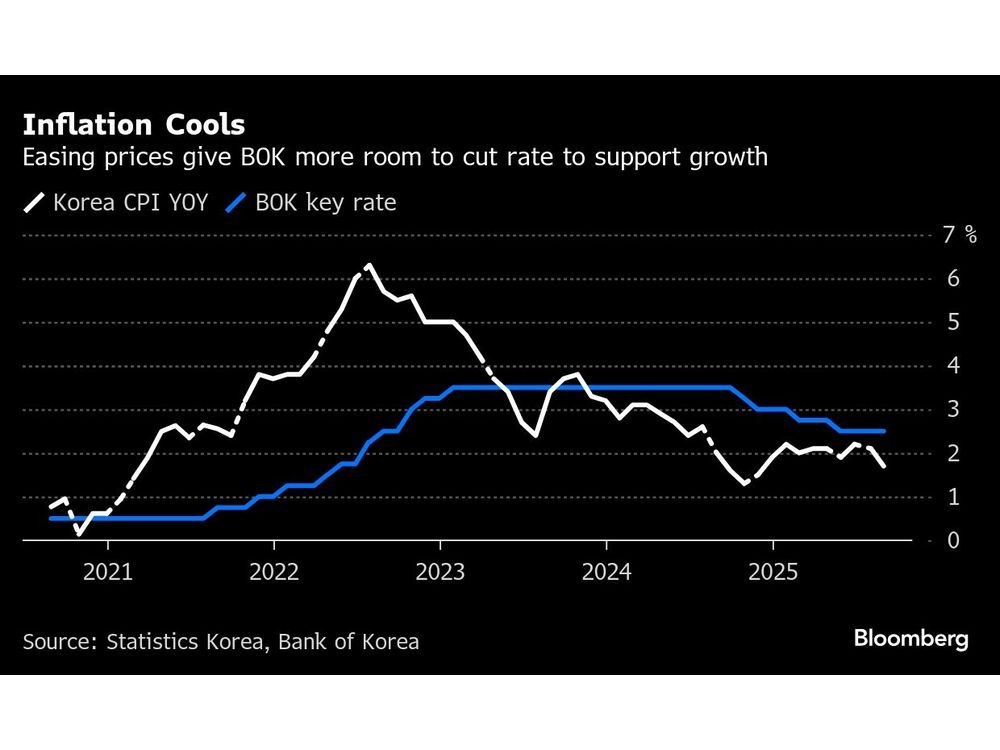South Korea’s consumer inflation cooled to the slowest pace this year, giving the central bank more room to resume its monetary easing cycle at its next policy meeting in October.
Why it matters
- The recent decline in inflation offers the Bank of Korea (BOK) a chance to reinstate monetary easing measures.
- A lower inflation rate can stimulate economic growth by making borrowing cheaper for consumers and businesses.
- This shift could influence market expectations and investment decisions in the coming months.
In a notable development for South Korea's economy, the country’s consumer inflation rate has decreased to its slowest level this year, providing the Bank of Korea with greater flexibility to consider resuming its monetary easing strategy at the upcoming policy meeting scheduled for October. This easing of inflationary pressures is a significant indicator for policymakers who have been navigating a complex economic landscape marked by rising prices and global economic uncertainties.
According to the latest data released by South Korea’s statistics agency, the consumer price index (CPI) rose by only 2.8% in September compared to a year earlier. This marks a reduction from the previous month’s inflation rate of 3.4% and is the lowest recorded inflation rate for 2023. The decline in inflation is attributed to a variety of factors, including a decrease in global energy prices and a stabilization in food costs, which have both contributed to easing the financial burden on consumers.
The BOK has been on a cautious path since it began raising interest rates in August 2021 in response to surging inflation. However, as inflationary pressures appear to be subsiding, the central bank is now in a position to potentially pivot its approach. Analysts anticipate that the BOK may opt to lower interest rates in an effort to invigorate economic activity and encourage spending, particularly in light of ongoing concerns about global economic growth and the potential for a recession.
The decline in inflation is particularly promising as it coincides with broader economic challenges faced by South Korea, including a slowdown in exports and sluggish domestic demand. Policymakers are hoping that a more accommodative monetary policy will provide the necessary impetus for economic recovery and growth, helping to support both businesses and households as they navigate these turbulent times.
In recent months, the BOK has signaled a willingness to remain flexible with its monetary policy, indicating that future decisions will be data-dependent. The central bank has emphasized the need to balance inflation control with economic growth, highlighting the importance of a stable economic environment for long-term prosperity. As such, the upcoming policy meeting will be closely monitored by economists and market participants alike, who are eager to gauge how the BOK plans to respond to the current economic conditions.
Furthermore, the easing of inflation could have broader implications for South Korea's financial markets. A lower interest rate environment tends to stimulate investment, as it reduces the cost of borrowing for companies looking to expand or invest in new projects. This could lead to an uptick in business confidence and spending, which is crucial for driving economic growth.
In addition, consumers may benefit from lower interest rates as well, with reduced mortgage and loan costs potentially boosting household spending. This increased consumer activity could, in turn, further support the economy, creating a positive feedback loop that helps to solidify a recovery.
The recent inflation data also aligns with trends observed in other major economies, where inflation rates have been moderating in response to central banks' aggressive rate hikes in previous years. As global inflationary pressures begin to ease, central banks worldwide are grappling with the timing and extent of possible monetary easing measures.
In conclusion, South Korea's latest inflation figures represent a critical turning point for the economy and its central bank. With the BOK potentially on the verge of resuming monetary easing, the implications for both economic growth and financial stability will be significant as the country looks to navigate the challenges ahead. Stakeholders from various sectors will be keenly watching how these developments unfold in the coming weeks and months.











